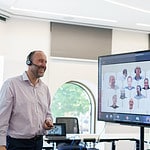To celebrate International Women’s Day, Kinetic IT is celebrating the social, cultural, economic, and political contributions of women both within the ICT industry and beyond.
This is the Sure to Rise podcast, providing a platform for a range of voices from Kinetic IT. The podcast will focus on this year’s International Women’s Day theme, Embrace Equity. Each episode aims to provide tangible insights and actions for women and allies to leverage and continue to build upon the great work done so far in the equity and diversity space.
Watch the full episode or access the transcript below.
Episode 2: Capability versus availability
Transcript – Episode 2 with Lucy Harding and Hannah Davey
Senior Manager, Strategic Workforce Development, Lucy Harding and Senior Manager, Employee Relations, Hannah Davey share their experiences working in a range of industries that have been male-dominated and advice to support workplaces to tackle gender equity. This transcript has been edited for clarity.
Jess Etheridge: Welcome to Kinetic IT’s Sure to Rise Podcast. When talking with friends and co-workers about this year’s theme, the question of ‘what does equity mean?’ has continued to come up in my conversations. The word equality and equity are often mixed up because when you first look at them, they’re written similarly, they kind of sound like they’re related. And they are interrelated. They both have to do with the way people are treated. However, they’re different and the actions you take to achieve those outcomes are different. So what’s the difference? I did a quick Google and the definition that I found was equality means each individual or group of people is given the same resources or opportunities. Equity recognises that each person has different circumstances and allocates the exact resources and opportunities needed to reach an equal outcome. This is episode two of the Sure to Rise podcast and today I’m joined by a couple of women who I think will really help us unpick this topic. Welcome, ladies. Please tell us who you are and what you do.
Lucy Harding: Okay, so Lucy Harding, I’m the senior manager for strategic workforce development at Kinetic IT. So I do things all around developing people, developing the business, leaning into change. I guess a bit about myself, I’m probably more than that, I’m more than just what I do here. So outside of Kinetic IT for those that don’t know me, I struggle to keep a plant alive, I’m learning to crochet, I’m just recently returned from the UK, visiting friends and family for the first time since COVID, so I’m all freshly renewed and topped up with that. But I think one of the things I wanted to call out just in introducing myself is that aligned with I guess the theme around equity in here is actually understanding the person in the whole and that we are perhaps more than we might appear to be just on the surface or from a certain set of labels.
Hannah Davey: I’m Hannah Davey. I’m currently in the role of senior employee relations specialist [Editor’s note: Since recording, Hannah has been promoted to Senior Manager, Employee Relations]. So my role here is supporting the organisation to understand and keep up with employment law changes, supporting the HR team through case management. Before this role with Kinetic IT, I’ve been in general HR and HR management roles for 16 years. I’ve spent most of my career in male-dominated industries. So this is an interesting topic to be talking about today. I’ve worked in fields such as local government, civil construction, and now IT which tend to have more men in the workforce than women. And so I’m also the mum of three amazing kids. I was a young mum, so I’ve been, I guess, on that parenting journey, juggling parenting and work for my entire professional career. Also, I love gardening, so as opposed to Lucy, I can keep plants alive but only with the assistance of my wonderful partner Danny, who does a lot of the work. So I enjoy growing some of our own food, and I’m also really passionate about yoga.
Jess: Thank you so much for joining me. What did you think of what I had to say at the start about the confusion sometimes between equity versus equality?
Lucy: I think it’s really understandable why it’s confusing in so far as the words are so similar. And if you nerd out and look into the root of the words, where they come from, which of course I’ve done, they come from a kind of same sort of source. But I think when we talk about equity, we’re saying actually we’re getting a fair shot at an equal outcome. I think that’s the thing that I kind of hold on to in that space and for me, it’s then about figuring out, ‘okay, well, if I understand the definition, understand what it means, what does that actually mean for me? How does it speak to me? How does that resonate with me? How does that impact in my space?’
Hannah: I think that’s so important, Lucy. I feel like early in my career, the language that we used was it was all about equality and it was treating everyone the same so that back then it was ‘we need to treat women the same as men, give them the same opportunities and the same treatment’. And I guess that applies to other diversity dimensions as well, or it did back then. But that doesn’t recognise that we’re all coming from a different place. We’ve got different challenges, different, advantages and disadvantages in giving everyone the same thing and treating them all as equals doesn’t support or accommodate the fact that we’re different people coming from different places, and we have different needs.
Lucy: Yeah, I agree, and a bit like yourself I come from a background of working in largely male dominated industries, working in defence and aerospace, finance and transport, oil and gas and all of these amazing places. But I’ve spent my entire career being surrounded by lots of, in many cases, wonderful men and the conversation I’ve had, certainly much earlier in my career with a lot of those individuals, is about, ‘OK, you want to be treated the same as us?’ Kind of. What I want is the same chance of success and the same opportunities of outcome, so that’s a little bit different. It doesn’t mean ‘exactly’, because you wouldn’t treat every one of those men in exactly the same way and expect the same outcome. So I think then it’s the idea of ‘treat everyone exactly the same is equal’, versus ‘treat every individual as an individual and give them an equal shot, an equitable outcome’. It’s much more nuanced, but I think it also leans into something that, from the time I’ve been at Kinetic IT that I would say this organisation has historically done relatively is this idea of personalisation. We’ve put a lot of effort into making things ‘the Kinetic way’ and our way of making things work for our people, our circumstances, and our customers. We talk about things that we’re doing now and we talk about strengths based leadership, and that’s a big element in there. One thing that comes up on my profile, which is probably why I really lean into this topic, is about personalisation. Can you view the individuals as individuals and, within a reasonable framework and to a reasonable level, tailor what you’re doing to help those individuals succeed and thrive and get to the best that they’re going to be and lean into those strengths, and that the outcome of success then feels equitable and accessible, it’s not necessarily about treating everyone the same way because if we’re really personalising, and if we’re really leaning in there, then you’re not treating people the same way. You’re treating people fairly with the same outcome in mind.
RELATED CONTENT: Sure to Rise / Episode 1: Celebrating First Nations women and addressing the gender pay gap
Jess: You actually just hit the nail on the head. In episode one, when I was speaking with Kathryn Logan, she made the really good point of it’s about people having the tools and resources to have that fair chance like you said, Lucy. It’s so important that we do recognise that everyone’s an individual and as I said at the top, people come from different backgrounds and contexts and all sorts of walks of life. So what does equity look like to them with their context in mind? It is very different, even compared with the person you’re sitting next to on the bus. Both of you have shared experiences coming from industries and workplaces that have been particularly male dominated. Hannah, what are one or two big lessons or insights that you’ve taken through your career journey now from those experiences?
Hannah: Well, I can relay an example of there was an organisation that I was in for quite a number of years, which was male dominated, and it was pretty old school in its way of thinking. Something that I experienced there from early on was that it was kind of an unwritten rule in that company that flexibility was only available at a certain level of the organisation. But once you were a professional or a senior professional or manager, it wasn’t acceptable to access flexible working arrangements, or any type of flexibility built into your working life. It was it was a bit of an unwritten rule, it was part of the culture. Long hours were valued, it was really rare to vary a person’s start or finish times to accommodate your personal or family priorities and it wasn’t expressed, but it was felt that if you wanted to be taken seriously or you wanted the opportunity to progress then you didn’t access flexible working arrangements. You’re in the office sitting at your desk for all of the hours of the day. I found this really challenging because I started in a mid-range professional role and I was already a mum and I couldn’t work within that kind of arrangement. I needed flexibility and I also wanted to be taken seriously and given the opportunity to do my best and to be challenged and potentially progress, but also to accommodate the fact that I value being a parent too. I was fortunate in that my direct manager was so supportive of flexibility and she had started to embed the concept of valuing a person’s capability over their availability, which was a pretty cool sort of catch phrase. That had started to be embedded in the culture there. When that manager left and I had the opportunity to step into that lead HR role, the HR team continued to encourage senior leadership to expand their thinking around employees being able to yes, have flexibility and yes have priorities outside of work, and also do challenging, meaningful work based on what they were capable of doing and working to their individual strengths and abilities rather than being valued based on how many hours you could spend sitting at a desk. So there was a gradual change over time. It’s part of that, I guess, influencing of the senior leadership there. So slowly there was an increasing number of professional and senior roles accessing the flexibility like part time work, flexible start and finish time – this was mums and dads. We saw the introduction of some work from home arrangements and that was even before COVID times. My team was able to bring in a policy and dedicated facilities for breastfeeding parents at work and there were enhanced parental leave options introduced. That was a cultural shift over a number of years that I was proud to be part of delivering and also pleased to be a beneficiary of. I think that kind of thinking has travelled with me throughout my career around that individual approach, value who a person is and what they can bring and what they’re capable of rather than their availability to perform work. It’s valuing the right things and helping those who make decisions to embed in their thinking those kinds of inclusive principles to understand that there can be invisible barriers to really good participation for some people, and how do we identify that those invisible barriers exist and how do we work to remove barriers.
Lucy: I think one of the things that you highlighted right at the start of that experience, and something that just feels really toxic actually, is this idea that it’s the ‘unwritten rule’. It’s not written, it’s not policy, but it’s understood and that’s one of the biggest challenges, I think, that probably many of us have faced and uncertainty around how to access those things. ‘Is there an unwritten rule in place?’, ‘am I going to be judged if I have different needs or express different views?’, ‘There’s a policy that says it’s okay, but if I actually do it, am I going to be penalised? Am I going to suffer socially? Or does that make me ineligible for promotion in the eyes of the manager?’ That’s where I think the kind of the work that we do, yes on the policy and the processes and the structures, the actual environment is so important. But there’s this other side of it that’s so powerful that you were working on, that you’ve been describing in terms of the culture, the leadership, the human interaction, the power that individual people, leaders, managers, anyone around the organisation can make in terms of creating a space that is more equitable, that is more accessible, that is fairer, and that’s by actually living to those things, you take advantage of them. You challenge in appropriate and respectful ways that create a narrative that says to someone, ‘this is my expectation, this is what I value, this is what I need from you’. And you kind of negotiate in those terms and you take with them, as a leader and as a human, a really, really impactful role, bringing those policies and bringing the structures of equity to life in the workplace. And I think now you can have all of the great guardrails in the world, but if the people who live and embody them don’t lean into that and if we each make a choice to step into that space, then on their own they don’t. They don’t do everything.
RELATED CONTENT: Sure to Rise / Episode 3: Being an intersectional ally
Jess: People work well together when there’s that synergy, you understand others. Like, when I’m in my team or when I’m working with people, I say ‘what does success look like and mean to you?’, ‘how can I best support you to achieve that?’ I am very much a believer of the ‘it takes a village mentality’ and working together to make it work for people. Because to Hannah’s point, there’s just life outside of work and that means something different to everyone. How can we make it real? I’m also going to pocket ‘capability versus availability’, I think that was a great catch phrase, as you said.
Hannah: I love that, I have loved that forever.
Jess: You can instantly visualise what that means and what that looks like in practice. Thank you so much. It kind of segways nicely into our next question. I’d love a bit of your professional views, what could organisations or people working in similar spaces such as yourselves do to start the conversations if there are no mechanisms or policies in place to support recognising equity?
Hannah: In my professional capacity, one of the things that I’m responsible for is keeping track of what’s going on in terms of employment law changes. There is a lot of change that is happening around us at the moment, and a lot of it does have a gender lens, which is wonderful. I guess to an extent it’s a little bit disappointing that it takes legislation to try and counter some of the gender-based challenges that women in the workforce have been experiencing for a really long time. But nevertheless, it’s a step in the right direction. So, we are seeing a lot of change unfolding in terms of the outcomes of the Respect at Work report. We’re seeing changes around sexual harassment and expectations of respectful conduct in the workplace, which safeguards people from having to experience things that are that are uncomfortable and put them at a disadvantage in their career. So that is a great change. We’re seeing changes in terms of gender pay gap and, you know, the pay secrecy changes that have recently come out are intended to an extent to allow women to understand if there is inequality in the way that they’re paid and there’s further legislation coming, legislation change coming into play that will be effective from next year, where organisations that report to the Workplace Gender Equity Agency, that’s WGEA, workplaces that report there will need to report and have published significant gender pay gaps. So I think those types of changes will be really supportive for women in addressing some of the things that have been tricky to address in the past. Organisations need to respond to those changes, but I don’t think that responding to those changes is enough. It’s not enough to just go, ‘the law’s changed, we need to have a policy’ or ‘we need to change our policy’. It’s also about education, embedding equity concepts and understanding gender challenges, understanding those things really deeply and being prepared to have conversations about it, and I guess acknowledging that there are some spaces or some scenarios where it is more difficult to be a woman in the workplace. That is something that we feel and that we experience. Policy change or legislation change helps to address some of those things, but there are some that are less visible and less obvious that we need to continue to address and to break down so that we’re all able to have equal access to successful outcomes.
Lucy: There’s a role that we can each play in as individuals, as whether that as leaders and you lean into all of the management leadership training that’s provided and available there for people, obviously, in a professional sense, that’s absolutely something that I advocate for. But I think there’s something that each of us take individual accountabilities in that. So there’s something in the environment, and absolutely it’s sad if it has to be legislated in, but it’s there. It helps us. It’s a purposeful step. And then there’s thinking, ‘well, what’s my individual accountability?’ and it’s ‘how do I make a difference?’ And maybe that’s looking at how you lead as an individual. It’s kind of recognising that actually I have only my own experience and I have my experience through my lens, and there’s probably people around me who are experiencing through a different lens. So actually stopping and listening to them, asking for that. In my professional sense, where we talk about organisational change type stuff. So how is this change going to impact these people? Not making assumptions that you know about each of those groups. We might be talking through a gendered lens about something here. But equally, there might be people within a demographic who experience that differently. So if I’m someone who looks like me, I might experience that quite differently to someone a person of colour might have a very different experience to the white, English, middle class girl, it’s just different. So having those moments where you pause and listen and look for people, create the space for them to share their perspectives and their stories because no one person or one perspective can represent everyone. And so I think when we’re talking as people managers or in a change space, actually acknowledging that and creating a space for those different perspectives to be voiced is just so, so powerful.
Jess: I didn’t need to ask the questions. You both actually provided really great answers and insights. Did you wanted to share any last pieces of advice?
Lucy: I would advocate for a book, surprisingly. This will shock everyone who knows me! Invisible Women by Caroline Criado-Perez. So if anyone is looking for a little bit of education, you want to understand more about the world around you and the the data bias around a world designed by men for men, and how that actually impacts not only women but other populations. It’s a fascinating, eye-opening book so if you actually want
to get some examples of bringing this topic to life, I cannot recommend that highly enough.
Hannah: That sounds good, Lucy, going to have to check that one out.
Lucy: I’ve bought it for a lot of people now, I’ve recommended and gifted this a lot. I think it’s fabulous.
Hannah: Great, I’ll borrow a copy.
Lucy: You know what, it’s based in data. It’s data and research and it’s an interesting book.
Hannah: I think data is really important when we’re trying to get to the bottom of what the experience of women is in the workplace because it takes away the emotion out of it and it gets to what is actually taking place, what’s observable, what can we measure? When I was doing a little bit of research for this topic, actually, Jess, I came across a study. It was done by George Washington University. So they did a study where they had men and women, men and men having conversations together and they measured how many times might a person interrupt the other person. And so they said this is facts, as Lucy talked about. So they found in their study that while men were talking with men, sorry, when men were talking with women, they interrupt 33% more than when they are talking with other men, whereas women would interrupt men less than half as much as men interrupt women.
So this is something that is factual and talks to an experience that women can have in the workplace and something that can impact on how a woman feels about her credibility and her confidence and her sense that she has a right to be there having that conversation so an action that can potentially be taken away is to have a look at where might you be engaging in these types of conversational practices and how could you create a space where they were less interruptions for women? ‘Hey, I really would like to hear what she’s saying, can we let her finish?’ Those types of little things could make a big difference for people in real life right now.
Jess: Thank you so much to both of you for joining me today and providing your insights. I know it can be a fraught and difficult conversation sometimes, but I truly appreciate the research and input that you’ve both shared and I think a lot of people will definitely be able to relate and understand. And I think you’ve both provided some really good pathways and great book recommendations, Lucy, for people to go and find and get on the pathway and journey if they’re not already. Thank you so much. This was episode two of the Sure to Rise podcast. You can find more on KineticIT.com.au.
About Lucy Harding

Lucy Harding is the Senior Manager, Strategic Workforce Development, at Kinetic IT, having joined the organisation in April 2021. She is passionate about the human element of change and growth, and has led learning and development for organisations in both the United Kingdom and Asia-Pacific.
About Hannah Davey

Hannah Davey is the Senior Manager, Employee Relations, at Kinetic IT. She joined the organisation in March 2022 and is a Human Resources professional with 15 years experience across senior HR partnering, leadership and management roles.














